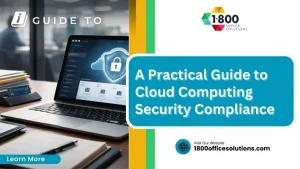Guide to Colocation and How to Choose a Provider
AI Overview:
This blog provides a comprehensive guide for businesses evaluating server colocation services. Drawing on decades of industry insight, it explains how colocation works, what features to prioritize, cost considerations, and how to ensure a smooth transition. The aim is to help business owners make informed, cost-effective decisions for reliable IT infrastructure management.

Understanding Server Colocation: A Comprehensive Guide to Choosing the Right Provider
Are you struggling with choosing the right server colocation provider? With 40 years of experience in office equipment leasing and repair, 1800 Office Solutions presents a straightforward guide that applies proven industry insight to managed IT services. The content explains what server colocation is, highlights key features to consider, and examines cost factors that affect provider selection. Business owners gain clear, actionable advice to overcome common challenges and secure reliable IT solutions.
What Is Server Colocation and How Does It Work?

Server colocation involves housing a company’s equipment in an external data facility. The approach offers high availability, robust ddos protection, and dependable colocation server hosting. Supported by advanced technology and telecommunications infrastructure, this model meets diverse business needs. Upcoming topics clarify its definition, business benefits, and various colocation service options.
Defining Server Colocation
Server colocation describes a setup where companies house their equipment in external facilities with reliable power, cooling, and security. This service supports a secure colo server environment that connects directly to the internet through experienced colocation providers located in prominent regions such as Dallas and Illinois.
The model helps organizations streamline IT operations by outsourcing infrastructure management to specialized colocation providers. Many businesses choose these strategic locations to access a robust colo server system that delivers consistent internet connectivity and operational efficiency.
Benefits of Colocation for Businesses
Server colocation facilities offer companies a dependable power supply and continuous network monitoring, which help maintain smooth operation of critical equipment. This arrangement lowers cost by transferring infrastructure management to experienced providers and effectively reduces latency, ensuring systems perform at peak efficiency.
Outsourcing equipment oversight to a dedicated facility simplifies management and frees internal resources for other strategic tasks. Companies benefit from a robust power supply paired with proactive network monitoring that minimizes latency and keeps overall cost in check.
Different Types of Colocation Services
Various colocation services offer clients distinct options that fit different operational requirements. Providers in the hosting and colocation sector design solutions that range from dedicated cabinets to hybrid models integrating physical setups with cloud resources, all while upholding high uptime and incorporating reliable backup measures.
Some providers extend managed colocation services that include network supervision and routine system upkeep, giving clients comprehensive support and backup functionality. This approach combines physical hosting with cloud integration to maintain seamless operations, ensuring each client’s uptime and overall system stability remains consistent.
Key Features to Look for in a Colocation Provider
Budget-conscious companies planning critical infrastructure rely on this guide’s insights. The section reviews data center locations, examines robust data security measures, outlines power and cooling needs, and details network connectivity options including benefits from shared space. These key features assist companies in selecting the provider that best meets their operational goals.
Analyzing Data Center Locations
Evaluating a colocation data center’s location provides key information that businesses need to support high-performance operations. Industry leaders choose colocation hosting providers that deliver robust colocation hosting server options, ensuring each co locate server meets modern operational requirements.
Firms assessing potential sites focus on the proximity to major network hubs, which positively affects speed and reliability. Careful consideration of facility infrastructure yields the information necessary to select a colocation hosting partner that maintains steady performance.
Evaluating Security Measures
Providers secure the data center by implementing strict access controls and regular surveillance to protect every portion of the available space. They maintain network performance with high-speed connectivity measured in gbps and stable ipv4 configurations to support reliable operations.
Robust digital safeguards work to protect customer information through real-time monitoring and efficient incident response techniques. These practices help clients overcome operational challenges while upholding security standards that preserve infrastructure integrity.
Understanding Power and Cooling Requirements
A reputable data center provider builds colocation facilities designed for consistent performance by deploying robust air conditioning systems that maintain the optimal climate for sensitive equipment. These colocation services combine reliable power management with effective cooling measures to support continuous operation and reduce risks associated with temperature fluctuations.
Evaluating power and cooling involves assessing how air conditioning controls the climate within a colocation environment, ensuring equipment performance remains stable. This thorough approach highlights the provider’s expertise in aligning colocation services with business requirements, offering dependable support for critical operations.
Considering Network Connectivity Options
The network connectivity options of a colocation provider represent a key factor in sustaining uninterrupted hosting and ensuring a resilient infrastructure. Companies across america benefit from quality facilities in cities like atlanta, where modern network designs support efficient data exchange and balanced colocation pricing.
Business owners should review connectivity features that offer sufficient bandwidth and low network latency to support mission-critical operations. Providers offering advanced hosting capabilities and robust infrastructure often align their colocation pricing with the quality of service delivered through dependable network connectivity options.
Factors Influencing the Cost of Colocation Services

This section explains pricing models for colocation data centers and guides businesses through estimating costs tailored to their needs. It covers evaluating charges related to dedicated servers, ip address management, and services offered by a trusted colocation hosting provider in a server colocation setup, providing practical insights into total expenses.
Breakdown of Pricing Models
Colocation service providers structure their pricing models with a fixed base fee combined with variable charges based on metrics such as square footage and power consumption. The contract terms clearly define fee tiers that allow businesses to align their investment with the scale of their colocation server setup.
Providers establish a transparent ecosystem that supports predictable expense management for each client. A clear contract and structured fee approach enable companies to plan their investment confidently while ensuring that the colocation server meets operational demands without unexpected costs.
Estimating Costs Based on Your Needs
Business owners should begin by assessing their current infrastructure needs with attention to factors such as ipv6 support and reliable internet access, ensuring that any chosen solution can accommodate future scalability. A transparent fee structure offered by providers in Europe helps businesses align operational demands with budgetary goals, providing insight into potential long-term value.
Expert providers recommend a detailed review of usage metrics to forecast expenditures effectively, thereby determining a fee that reflects actual resource requirements. Evaluating how colocation services support ipv6 connectivity, maintain steady internet access, and offer scalability allows companies to choose a solution that meets both current and future needs.
Assessing Hidden Fees and Charges
Organizations must review colocation contracts thoroughly to pinpoint any hidden fees associated with computer maintenance, increased bandwidth usage, or additional managed services. Providers may include extra charges for features like advanced firewall support that safeguards data protection measures while ensuring service quality.
A meticulous evaluation of service agreements reveals detailed fee structures and prevents unexpected costs from affecting overall expenses. Transparent terms that clearly state charges for computer operations, firewall features, and managed services enable businesses to secure robust data protection and reliable bandwidth allocation.
How to Evaluate Potential Colocation Providers
Industry certifications and compliance checks help assess colocation providers on physical security standards. Reading customer reviews and case studies reveals performance details in vps hosting and colo server hosting, while visiting data center facilities in the new york metropolitan area verifies cheap colocation options for businesses.
Checking Industry Certifications and Compliance
Reviewing industry certifications gives business owners a clear measure of a provider’s reliability in server hosting colocation services. Providers located in seattle often meet rigorous standards that guarantee strong access control, dependable internet connectivity, and transparent price structures.
Examining certification documents reveals that many providers follow strict compliance practices, which can directly affect operational stability. This review process helps companies assess how pricing aligns with secure access control and efficient internet connectivity in their server hosting colocation setup.
Reading Customer Reviews and Case Studies
Customer reviews provide practical insights on a colocation provider’s management of IT infrastructure. They reveal how carefully arranged rack units support optimal equipment performance, reliable electricity distribution, and effective surveillance measures that increase operational confidence.
Case studies offer real-world examples demonstrating measurable performance and security practices. They document how well-maintained equipment and strategic rack unit configurations work with smooth electricity management to build a stable IT infrastructure while active surveillance reinforces overall safety.
Visiting Data Center Facilities
Visiting data center facilities gives business owners a chance to inspect the infrastructure and server arrangements firsthand. During these visits, evaluators can verify the use of renewable energy measures and see how operational practices may lower overall expense.
Observing the facility in person provides insight into cooling systems and power management that support efficient server performance. This firsthand review helps decision-makers confirm that renewable energy integration and cost structures align with long-term expense management goals.
Making the Transition to Colocation Seamlessly

Planning the migration process sets a clear path for server colocation implementation. Minimizing downtime during transition helps maintain uninterrupted operations, while post-migration best practices guide ongoing system upkeep. Business owners receive practical steps to shift to a qualified colocation provider without disruptions, ensuring a smooth and effective changeover.
Planning the Migration Process
Organizations planning the migration process begin by reviewing their existing IT setup and establishing a clear timeline to reduce downtime during the transition. They compile detailed equipment inventories, schedule connectivity tests, and set up backup protocols to support a reliable move to a new colocation environment.
The migration team works closely with the colocation provider to test server configurations and assess network performance before transferring full operations. This coordinated approach allows decision-makers to confirm that the new colocation setup aligns with performance standards and supports continuous business activity.
Minimizing Downtime During Transition
Business owners can minimize downtime during a server colocation transition by scheduling pre-migration testing and aligning detailed migration plans with their existing infrastructure. Coordinating with experienced colocation providers ensures that network configurations and backup protocols are verified, reducing service interruptions during the move.
Detailed planning and careful review of server configurations help identify potential issues before the transition begins. Testing connectivity and validating power management systems play a crucial role in maintaining continuous operations during a server colocation move.
Post-Migration Best Practices
Post-migration, organizations should conduct routine system evaluations to validate that the server colocation environment operates as expected. Regular assessments of network throughput, backup configurations, and cooling systems support continuous performance and build confidence in the new setup.
Expert teams update documentation and establish scheduled maintenance reviews to catch any configuration discrepancies early. Close coordination with the colocation provider enables businesses to secure their IT infrastructure and maintain a stable, secure data center operation.
Frequently Asked Questions About Server Colocation
This section addresses key questions on server colocation covering its optimal use, differences from cloud hosting, support expectations, and scalable arrangements. The insights offered assist business owners in evaluating provider options and aligning services with specific operational needs.
What Are the Best Uses for Colocation?
Businesses use colocation for hosting mission-critical systems and data centers that require continuous uptime and reliable support. Colocation facilities deliver a stable environment complete with modern power, cooling, and security measures that reduce internal maintenance demands. This approach enables companies to streamline IT management and maintain a dependable operational framework with external expertise.
Effective colocation also proves beneficial for disaster recovery and remote backup initiatives that protect against unexpected operational challenges. Organizations with expanding IT needs choose these services to scale infrastructure without significant capital expense while ensuring secure data management. This strategy allows companies to focus on growth and strategic objectives while relying on specialized providers for reliable IT operations.
How Does Colocation Compare to Cloud Hosting?
Server colocation places a company's physical servers in dedicated facilities that provide robust security, reliable power, and professional infrastructure management. Cloud hosting, by contrast, offers virtualized resources that adjust to fluctuating business needs while reducing the demand for on-site hardware management.
Firms that opt for server colocation appreciate the ability to customize hardware configurations and maintain direct oversight, whereas those selecting cloud hosting benefit from scalable resource allocation and streamlined management processes. Business owners evaluate these models based on performance requirements, budget constraints, and long-term IT strategy to choose the solution that best aligns with their operational goals.
What Level of Support Should I Expect?
Business owners engaging with a reputable server colocation provider experience technical support that handles routine maintenance and swift troubleshooting. Providers maintain a structured assistance system featuring round-the-clock remote monitoring and prompt responses that secure system functionality and network connectivity.
Clients benefit from a dedicated support team offering clear communication and practical guidance for managing IT infrastructure. This dependable service, backed by a transparent agreement, ensures businesses optimize their server colocation investment while sustaining continuous system availability.
How Can I Scale My Colocation Arrangements?
Businesses can scale server colocation arrangements by increasing their designated space and adjusting power and cooling configurations as their infrastructure grows. Companies engage with experienced colocation providers to review current usage trends and modify contracts that reflect future expansion plans, ensuring a scalable IT environment that meets ongoing performance standards.
Scaling efforts also include reassessing network connectivity and backup systems to accommodate a growing workload. Providers offer modular solutions that allow companies to add capacity gradually, and decision-makers monitor performance metrics to align resource requirements with business demands while preserving operational stability.
Conclusion
Server colocation supports businesses in managing their critical IT systems with enhanced security and dependable performance. The guide offers clear insights on selecting providers based on data center locations, robust security measures, and transparent pricing models. It shows how proper evaluation and strategic planning reduce downtime and align operational costs with growth objectives. Business owners benefit from actionable steps and expert insights that drive informed decisions and maintain steady, scalable operations.











